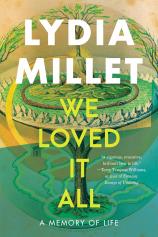We Loved It All: A Memory of Life
Review
We Loved It All: A Memory of Life
Lydia Millet is best known as a prolific and admired fiction writer, with books like A CHILDREN’S BIBLE and LOVE IN INFANT MONKEYS selected as finalists for the National Book Award and Pulitzer Prize, respectively. However, her new book, WE LOVED IT ALL, reveals that she is equally gifted at nonfiction, worthy of comparison to the legendary Annie Dillard and contemporaries like Rebecca Solnit and Margaret Renkl.
Part memoir and part thoughtful reflection on the perilous state of our relationship to the natural world, it’s above all a profound examination of what it means to be human. Millet’s is a gentle but insistent voice conveying an urgent message about the future of the planet and the creatures that inhabit it that somehow seems easier to tune out when delivered in more strident tones. She can’t be ignored so cavalierly.
WE LOVED IT ALL emerges from Millet’s work for more than a quarter century as an editor and staff writer for the Center for Biological Diversity, based near her home in the desert outside Tucson, Arizona. Her most recent novels, A CHILDREN’S BIBLE and DINOSAURS, have been infused with environmental themes. But in turning to nonfiction for the first time, she has decided to claim that subject matter explicitly.
"Part memoir and part thoughtful reflection on the perilous state of our relationship to the natural world, it’s above all a profound examination of what it means to be human."
The book’s three sections are, at best, loosely structured. And though its chapters aren’t demarcated as such, it’s almost possible to pick any one at random and read it as a self-contained essay, particularly on the second reading that it merits. Millet glides effortlessly from glimpses of her life into illuminating discourses on often obscure corners of the animal and plant worlds. She gracefully knits them into a seamless whole that reveals her agile, deeply associative intelligence.
Millet spent most of her childhood in Toronto, the daughter of a college professor who specialized in Egyptology and a mother who grew up on a farm in Georgia and whose current use of pesticides she describes in frank detail. While studying in France during her college years, Millet knew she wanted to be a writer, but the path to publication of her first novel in 1996 detoured into day jobs that included editing copy at a “gun lovers’ magazine” and Hustler. She muses about her own childhood and her experience as the mother of two children, particularly in thinking about the damaged and dangerous world she believes her daughter and son will inherit.
That world is one where “millions of species have disappeared virtually overnight” and where, over the past 50 years, the planet’s wildlife populations have declined by an average of 69 percent. Unassumingly displaying the breadth of her knowledge and curiosity, Millet touches on some of the perils facing an impressive array of fauna that include the world’s small hummingbird species --- the two-inch-long bee hummingbird of Cuba --- and blue whales, the largest animals ever to have lived on earth. She advances a variety of provocative arguments about animal intelligence, and even potential personhood, contrasting the failure to recognize it with the United States Supreme Court’s extension of that status to corporations in the Citizens United case.
But above all, Millet takes a clear-eyed view of where our lifestyle, founded on fossil fuels and petrochemicals, is leading us. Over her lifetime of 56 years, she writes, our “monomythic story of progress and triumph” where “[m]arvelous machines seem to be moving us toward omniscience, and on-screen future humans continue to cross the galaxy as masters of the universe” has shifted to one revealing that “our way of life is not a triumph anymore but a mass suicide.”
Nonetheless, hers is not a counsel of despair, as she urges us to consider ourselves “the parents of the world to come.” Rather than limiting herself to a nightmare vision of an environmental apocalypse, she also tries to paint a hopeful, even optimistic, vision of how we might turn back from this unsustainable course. “Remember the future, I have to tell myself, when desperation shades into despair. Remember not only your fear but your hope --- remember the possibilities.” As an incentive to do so, she summons up the vision of “a peaceful village or a green countryside. A city on a hill. A glowing place with soft shadows. Of the fellowship of strangers.”
Whatever the subject, Millet writes with a supple, unselfconscious lyricism. It would be possible to fill a review with examples of her evocative prose, as in this representative passage:
“Smell recedes, and with it the richness of a constant access to sensory memory --- the scents of beloved people, of strangers and of crowds, of skin and place and bloom and rain, of food and fear and the synesthetic coolness of breathing in eucalyptus or peppermint.”
One would have to be unconscious to ignore the daily accounts of rising ocean levels, extreme weather events, and all the other evidence of looming environmental disaster that surrounds us. In this wise, compassionate book, Lydia Millet attempts to connect with our consciousness at a deeper level and, above all, urges that we “tell ourselves a better story than the one about winning and losing, about conquering and subsuming.” It will be generations before we know which story will prevail, but the nobility of her effort to craft a new and enduring one unquestionably appeals to all that is best in us.
Reviewed by Harvey Freedenberg on May 25, 2024
We Loved It All: A Memory of Life
- Publication Date: April 22, 2025
- Genres: Essays, Nature, Nonfiction
- Paperback: 272 pages
- Publisher: W. W. Norton & Company
- ISBN-10: 1324105259
- ISBN-13: 9781324105251




